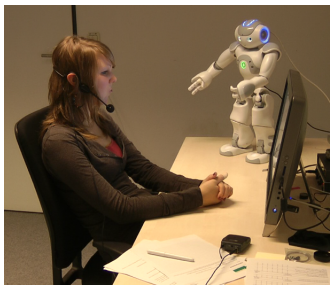Understanding the effects of Socially Assistive Robots (SAR) on human’s task performance is crucial for designing powerful assistive systems. A variety of interaction design questions have to be taken into account in order to implement SAR. We present the results of a case-control study (no robot present vs. robot giving generic motivational feedback vs. robot giving task performance related feedback) for a scenario in which a SAR assists users on a cognitive task.
 The cognitive task
The cognitive task
Results show that SARs can have positive effects on user’s task performance on cognitive tasks and that the task is perceived as pleasurable if the robot’s feedback is appropriate to the user’s task processing.
 Socially assistive robot supporting on the task.
Socially assistive robot supporting on the task.